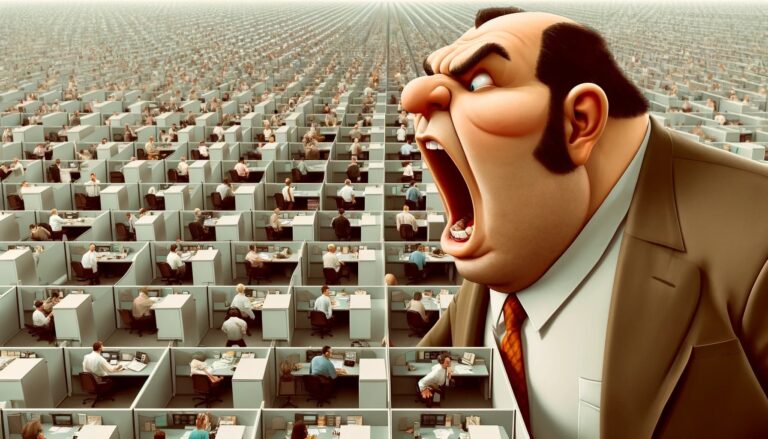There are credible theories, reinforced by the public choice analysis of bureaucracy, according to which the administrative state is economically inefficient and politically dangerous – “politically dangerous” meaning a risk of growing or feeding the Leviathan. (For an overview, see Gordon Tullock, BureaucracyLiberty Fund, Inc., 2004); and Dennis C. Mueller, Perspectives on public choices (Cambridge University Press, 1997).) At the opposite end of the spectrum of democratic power is the political state or the state of politicians, where elected officials can overthrow the state bureaucracy at will.
Many critics of the administrative state, even when they make good arguments, often ignore the drawbacks of the politician state (see for example “Philip Hamburger on the Threats of the Administrative State”, a Future of Liberty podcast with host Mitch Daniels). If we can think of the administrative state as equivalent to the “administrative despotism” described by Alexis de Tocqueville in Democracy in America (Chapter 6 of volume 4)The state of politicians is not unlike the fanciful aspect of the French political scientist’s description of ancient and arbitrary tyranny. Although I have not always thought so, the fanciful tyranny of the state of politicians is at least as bad for liberty and prosperity as the despotism of the administrative state. This is illustrated by a fact revealed during the trial and retrial of Senator Bob Menendez, whom a federal jury in New York convicted on several counts of bribery and bribery on July 16 (“Senator Bob Menendez Found Guilty of Corruption” the wall street journalJuly 16, 2024). The the wall street journal Previously reported (“Menendez declared his “resurrection.” Then he fell in love,”July 10, 2024), speaking of one Wael Hana, a New Jersey businessman who was concurrently convicted of paying bribes to Menendez and his wife:
Hana was seeking a lucrative export contract with Egypt for his halal business, even though he had no experience in the field. Menendez contacted a U.S. agriculture official whose agency had expressed concerns about the monopoly the contract would create.
“Stop interfering in my constituent’s business,” Ted McKinney, the agriculture official, recalled Menendez saying on the call.
The huge bureaucracy of the US Department of Agriculture is of course representative of the administrative state, which administers the laws passed by elected representatives of Congress. It also indirectly influences legislation through its regulations, and even its influence on the political agenda. I am not sure why the USDA interfered in Hana’s exports to Egypt, since the monopoly on imports of halal beef kidneys into that country had been granted by the Egyptian government. THE Washington Post suggests The reason was that Hana’s monopoly would exclude other American exporters of this product from the Egyptian market, as happens whenever a foreign government decides to do so for one reason or another. (See also “Witness in Menendez Corruption Trial Details Egypt’s Halal Beef Monopoly System” Courthouse Information ServiceJuly 3, 2024.) Political and bureaucratic issues being what they are, it would not be surprising if Hana needed a license or unofficial authorization to export her beef kidneys to Egypt. But my point is that, despite the supposed rule of law, an elected official was able to impose his whims, corrupt or not, on civil servants. How is that better than the administrative state?
The fact that the undersecretaries of agriculture, who then held Mr. McKinney’s position, were political appointees does not change the inherent opposition between the administrative state and the gimmicky state. It simply shows that the administrative state is less autonomous, more subject to the gimmicky state in the United States, than in many, if not all, major Western countries.
Many other examples could be found, perhaps more striking. good arguments suggesting that a central bank is detrimental to free banking and private currencies. But given that the government exists with a partial monopoly on issuing the nation’s currency, who could argue that this power would be any less dangerous in the hands of the president or Congress than in the hands of an independent bureaucracy like the Fed? Tariff policy is another example: Congress set tariffs in the 19th century, and its policy was not exactly a success (see Doug Irwin’s book). Trade conflicts), and recent presidents have been, if possible, even worse.
What is the conclusion? When the state has the power to grant great privileges (money or other types of benefits) to some citizens at the expense of others, it is to be expected that the profiteers will spend resources to get their hands on the treasure, including through informal or (as in the Menendez case) formal bribes. It is impossible for an ambitious, activist, and inquisitive government to exist without a large administrative apparatus or capricious and arbitrary political leaders or a combination of the two. The fundamental problem is not the administrative state or the capricious state of politicians, it is the powerful state. The cult of elected officials is as bad as the administrative state. These general results do not depend on the ideological nuance of the party in power or the country in question.
*****************************

The Whimsical Political State. By DALL-E under the influence of your humble blogger


